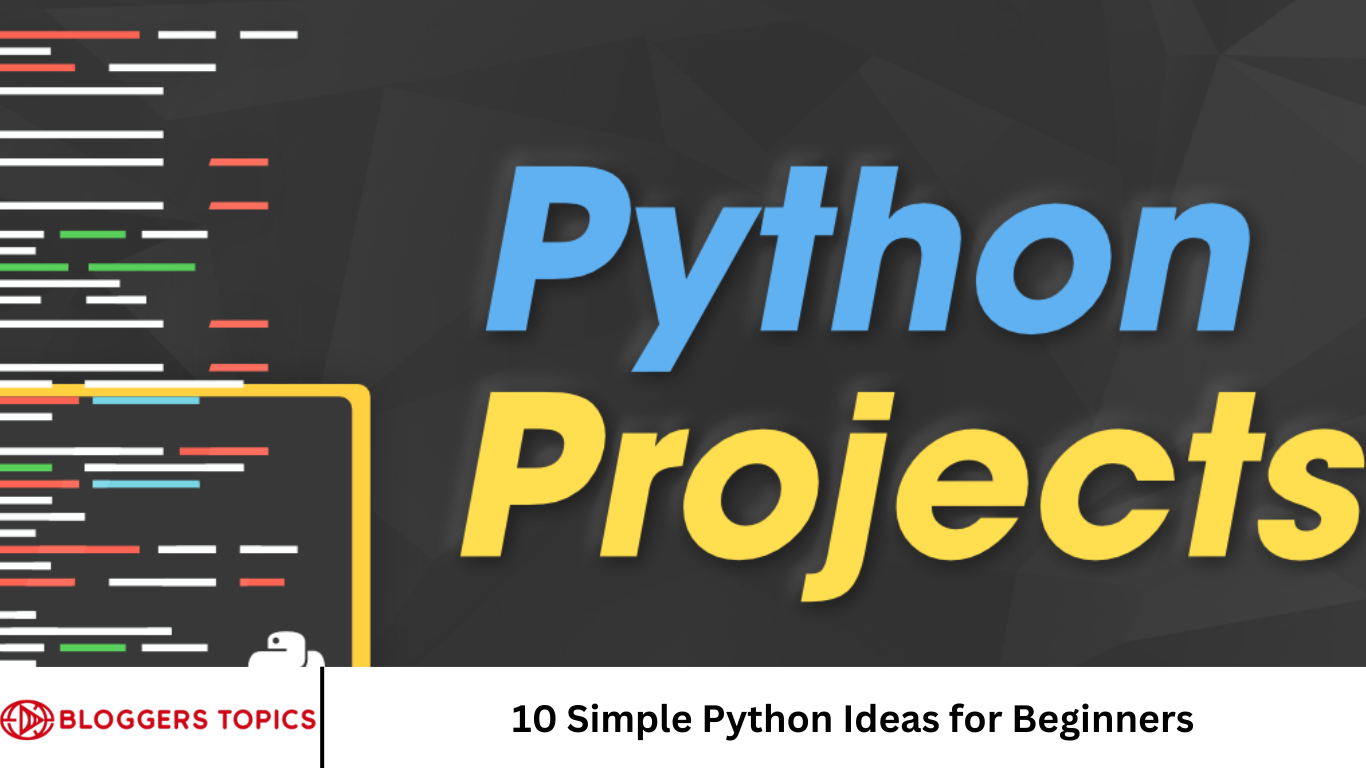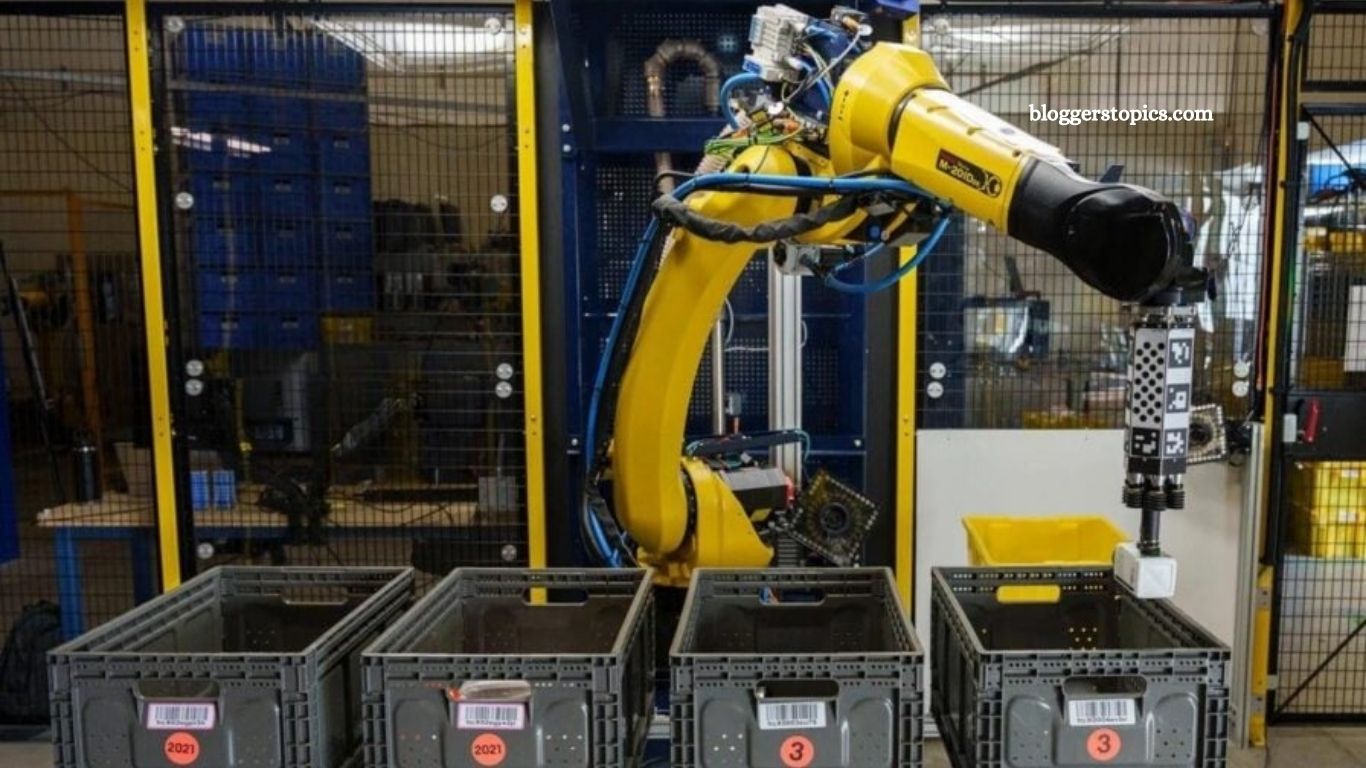Python has become one of the most popular and versatile programming languages in the world. Whether you’re a beginner or an experienced coder, Python is easy to learn and highly effective for various applications, ranging from web development to data analysis.
If you’re just starting out, working on projects is one of the best ways to improve your Python skills. In this article, we’ll explore 10 simple Python ideas for beginners that will help you build a solid foundation in programming, while also helping you create a portfolio that can impress future employers.
More Read: Top Noise-Cancelling Headphones of 2025: Tested for Music, Travel, and Sleep
Why Python is Ideal for Beginners
Before diving into the projects, let’s take a moment to understand why Python is such a great choice for beginners.
- Easy Syntax: Python has a clean, readable syntax that allows you to focus on solving problems rather than getting bogged down by complex language rules.
- Large Community: Python has an active and helpful community of developers who regularly share resources, tutorials, and libraries that make learning easier.
- Versatility: Whether you’re into web development, machine learning, data analysis, or automation, Python has libraries and frameworks for nearly every domain.
- Cross-Platform Support: Python works on all major operating systems like Windows, macOS, and Linux, so you can develop and run Python programs anywhere.
With these advantages, Python is an excellent choice for anyone who is new to coding.
1. Number Guessing Game
A number guessing game is one of the simplest yet most fun projects to start with. The game asks the player to guess a number within a range. After each guess, the program provides feedback whether the guess is too high, too low, or correct.
Key Concepts Covered:
- User input
- Random number generation
- Conditionals (if/else statements)
- Loops
Why It’s a Good Idea:
This project teaches you the fundamentals of controlling the flow of the program based on user input. It’s also a great way to learn about randomization and decision-making in Python.
2. Simple Calculator
A basic calculator that can perform operations like addition, subtraction, multiplication, and division is another great beginner project. The user enters two numbers and selects the operation to perform.
Key Concepts Covered:
- Functions
- User input
- Mathematical operations
- Conditionals
Why It’s a Good Idea:
Creating a calculator helps you solidify basic programming concepts and practice writing functions. It’s also a good project to learn about handling exceptions, such as division by zero.
3. To-Do List Application
A simple to-do list app allows users to add, view, edit, and delete tasks. It helps you practice working with lists and dictionaries in Python. You can enhance the project by saving the tasks to a file or a database.
Key Concepts Covered:
- Lists and dictionaries
- File handling (optional)
- Loops
- Functions
Why It’s a Good Idea:
This project teaches you how to manage data in a structured way. It’s a great introduction to working with data persistence if you choose to add file handling or databases to the project.
4. Basic Web Scraper
A web scraper extracts information from websites automatically. For example, you could create a scraper that fetches the latest news headlines or weather data from a website. This project will introduce you to web scraping libraries such as BeautifulSoup and requests.
Key Concepts Covered:
- HTTP requests
- Parsing HTML with BeautifulSoup
- Extracting and storing data
Why It’s a Good Idea:
Learning web scraping with Python is valuable for beginners interested in data collection. It teaches you how to work with external libraries and interact with web data programmatically.
5. Flashcard App
A flashcard app is a useful tool for learning new information. The user can input questions and answers, and the app will quiz them on their knowledge. You can add features like random question selection or the ability to track progress.
Key Concepts Covered:
- Lists and dictionaries
- Loops
- User input
- Functions
Why It’s a Good Idea:
Creating a flashcard app helps you get comfortable with data structures, loops, and conditionals. It’s also a fun project that has practical applications in education and learning.
6. Simple Countdown Timer
A countdown timer is a simple Python program that counts down from a set number of seconds and alerts the user when time is up. This is a good project to practice working with time and loops.
Key Concepts Covered:
- Time handling in Python (
timemodule) - Loops
- User input
Why It’s a Good Idea:
This project gives you hands-on experience with Python’s built-in time module, which is a useful skill for any programmer. It also teaches you how to create programs that run on a timer.
7. Unit Converter
A unit converter is a tool that allows users to convert between different units, such as length (meters to feet), weight (grams to pounds), or temperature (Celsius to Fahrenheit). You can design a simple command-line tool to handle these conversions.
Key Concepts Covered:
- Functions
- User input
- Mathematical operations
- Conditionals
Why It’s a Good Idea:
A unit converter teaches you how to work with different types of data (e.g., numerical values) and create functions to perform specific tasks. It’s also an opportunity to practice unit conversions and learn about handling different types of units.
8. Simple Digital Clock
Creating a simple digital clock in Python involves displaying the current time and updating it every second. You can use the Tkinter library to create a graphical user interface (GUI) for this project.
Key Concepts Covered:
- Working with time (
timemodule) - GUI programming (using Tkinter)
- Loops
Why It’s a Good Idea:
This project is ideal if you want to learn how to create a basic GUI application with Python. It also reinforces your knowledge of loops and time handling.
9. Simple Chatbot
Building a simple chatbot is a fun and interactive way to practice your Python skills. The chatbot can respond to basic commands or simulate a conversation. You can use simple conditionals to match user input to a set of predefined responses.
Key Concepts Covered:
- String manipulation
- Conditionals
- Functions
Why It’s a Good Idea:
A chatbot project helps you practice working with text and string manipulation. It also introduces you to the concept of natural language processing (NLP), even if in a very basic form.
10. Rock, Paper, Scissors Game
The classic rock-paper-scissors game allows a user to play against the computer. The user chooses rock, paper, or scissors, and the program generates a random choice for the computer. The winner is determined based on the rules of the game.
Key Concepts Covered:
- Random number generation
- Conditionals
- User input
Why It’s a Good Idea:
This project is an excellent way to practice working with random values and conditionals. It’s simple enough for beginners but still incorporates a lot of important programming concepts.
Tips for Building Python Projects
While working on any of these Python projects, keep the following tips in mind to ensure you’re making the most of your learning experience:
- Start Small: It’s easy to get overwhelmed, especially if you’re a beginner. Focus on building a small, working version of your project first. You can always add more features later.
- Test as You Go: Don’t wait until your entire project is complete to test it. Regularly run your code to check for bugs and ensure everything is functioning as expected.
- Document Your Code: Writing comments and documentation for your code will help you understand it better in the future and make it easier for others to follow.
- Refactor Your Code: Once you’ve completed a project, go back and see if you can optimize or clean up your code. Refactoring helps you improve your coding practices.
- Seek Feedback: Don’t hesitate to share your projects with other Python developers or communities. Constructive feedback is an excellent way to learn and improve your skills.
Frequently Asked Question
Why should I work on Python projects as a beginner?
Working on Python projects is an excellent way to reinforce your learning. It helps you apply the concepts you’ve studied, improves problem-solving skills, and makes learning more hands-on. It also allows you to build a portfolio of work, which is helpful for job hunting or building credibility as a programmer.
What is the best project to start with if I’m completely new to Python?
The best project to start with is a simple Number Guessing Game or a Basic Calculator. These projects are simple enough to help you understand key concepts like loops, conditionals, and user input without overwhelming you. Once you feel comfortable with these, you can tackle more advanced projects.
How do I choose a project from the list of 10 simple Python ideas?
Choose a project that interests you and aligns with what you want to learn. If you’re curious about web scraping or working with external data, go for the Web Scraper project. If you’re into GUI development, try building the Digital Clock using Tkinter. The key is to start with something that excites you!
Do I need to learn libraries or frameworks for these beginner projects?
While you don’t necessarily need advanced libraries or frameworks for all of the beginner projects, some like the Web Scraper and Digital Clock will require basic libraries such as BeautifulSoup and Tkinter, respectively. It’s a great opportunity to learn about these libraries and see how they extend Python’s capabilities.
How can I improve my Python projects after completing them?
Once you’ve completed a project, you can always enhance it by adding more features. For example, if you’ve built a To-Do List Application, you can add a feature to save tasks to a file or use a database for persistence. You can also improve the user interface, add error handling, or make the code more efficient by refactoring it.
Are these projects suitable for self-learning or should I take a course first?
These projects are perfect for self-learning! If you’ve learned the basic syntax and concepts of Python (variables, loops, conditionals, and functions), you can dive right into these projects. However, if you’re struggling with the basics, taking an introductory Python course or following tutorials can provide additional guidance.
What if I get stuck while working on a project?
If you get stuck, don’t worry – it’s a natural part of the learning process! Start by breaking down the problem into smaller tasks. Use Python’s official documentation, search for solutions on platforms like Stack Overflow, or ask for help from the Python community. Don’t be afraid to experiment and debug your code to find solutions.
Conclusion
Python is an excellent choice for beginners due to its simplicity, readability, and wide range of applications. These 10 simple Python ideas for beginners provide a great starting point to learn and practice essential programming concepts while building projects that you can add to your portfolio. Whether you’re interested in game development, data analysis, web scraping, or GUI design, there’s a project idea for you. As you complete each project, you’ll gain more experience, confidence, and a deeper understanding of how Python works. So pick one of these ideas, start coding, and enjoy the process of learning Python!





